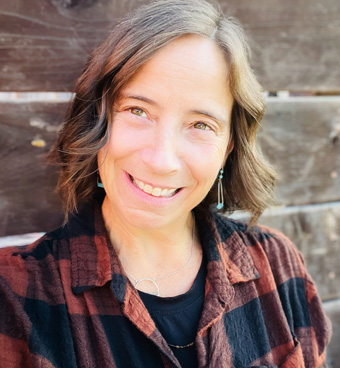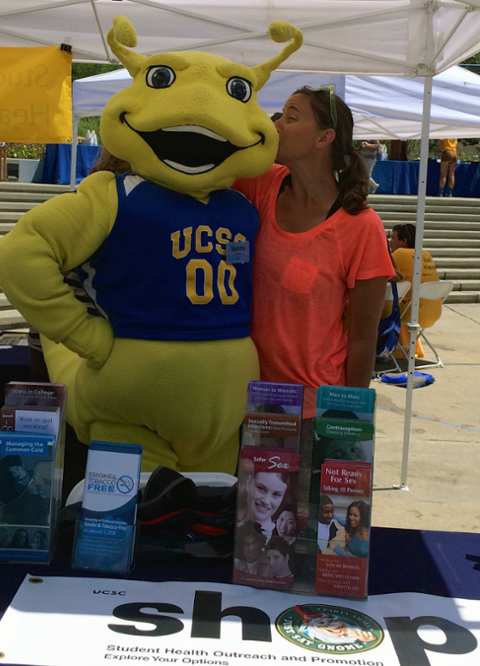Tell us a bit about yourself, your background, and how your path led to where you are today.
I am from Wisconsin originally but moved “out west” after I visited my brother in Utah and fell in love with the mountains. I worked for a year to get residency and completed my undergrad at Utah State University. From my  midwestern roots and love of the Great Lakes, my love of all things outdoor really grew in college - from hiking and camping to river rafting, skiing, ultimate frisbee and backpacking. From the highest peaks to the red rock canyons of Southern Utah and everywhere in between! My husband and I met in college and after our undergrad degrees, we moved to Corvallis, Oregon where we both did graduate school at Oregon State University. Our daughter came along and she quickly adapted to our outdoor lifestyle (her first camping trip she was three weeks old!).
midwestern roots and love of the Great Lakes, my love of all things outdoor really grew in college - from hiking and camping to river rafting, skiing, ultimate frisbee and backpacking. From the highest peaks to the red rock canyons of Southern Utah and everywhere in between! My husband and I met in college and after our undergrad degrees, we moved to Corvallis, Oregon where we both did graduate school at Oregon State University. Our daughter came along and she quickly adapted to our outdoor lifestyle (her first camping trip she was three weeks old!).
We moved to Santa Cruz for my husband’s job as a fish biologist with the National Marine Fisheries Service. Within two months, I got a job at UCSC and I’ve been here ever since (21 years!). I have been a public health professional for over 30 years, so I care deeply about sustainability because the health of our planet, communities and ecosystems are interconnected and it is very difficult to have personal health without planetary health.
As an avid promoter of health education, what is the most challenging and the most rewarding part of your job?
To be honest, the health education part of my job is the easiest. We have amazing team members at SHOP that connect with students in very profound ways. When students are met with unconditional positive regard and free from judgment when accessing support services like sexual and reproductive health, alcohol and other drug prevention and intervention services and mental health promotion and skill building, they are better able to make decisions that are best for them with the full range of information - that’s the direct programs and services that SHOP offers. The more challenging aspects of doing health promotion work on a college campus is trying to shift or change culture in a large organization with competing demands in a more coordinated fashion to have a greater impact. This is what we call systems or environmental strategies in public health.
I understand you are involved in the adoption of the Okanagan charter at UCSC. Can you tell us about it?
I am the co-chair of a workgroup that was charged by Akirah Bradley-Armstrong, the Vice Chancellor of Student Affairs and Success, to prepare UCSC to adopt the charter. The Okanagan Charter provides foundational language, principles and a vision for wellbeing in person, place and planet for colleges and universities. By adopting the charter, we are making an institutional commitment to move toward more systems-level strategies that influence the health and wellbeing of every member of the UCSC community and begin the process of becoming a true Health Promoting Campus.
 Using setting and systems approaches, the areas of focus as we begin this work will be organized into five key pillars: Belonging & Connection; Faculty/Academic Success; the Culture of Wellbeing; Sustainability; and the Supporting Infrastructure. We are working to facilitate a shift in culture at UCSC to promote wellbeing by embracing and enhancing elements like the practices, policies, protocols, people and philosophies that positively contribute to health. Simultaneously, we aim to work to reduce or eliminate aspects of campus culture that hinder health and wellbeing.
Using setting and systems approaches, the areas of focus as we begin this work will be organized into five key pillars: Belonging & Connection; Faculty/Academic Success; the Culture of Wellbeing; Sustainability; and the Supporting Infrastructure. We are working to facilitate a shift in culture at UCSC to promote wellbeing by embracing and enhancing elements like the practices, policies, protocols, people and philosophies that positively contribute to health. Simultaneously, we aim to work to reduce or eliminate aspects of campus culture that hinder health and wellbeing.
The Okanagan Charter clearly states:
“Health promotion requires a positive, proactive approach, moving “beyond a focus on individual behaviour towards a wide range of social and environmental interventions” that create and enhance health in settings, organizations and systems, and address health determinants. As such, health promotion is not just the responsibility of the health sector, but must engage all sectors to take an explicit stance in favour of health, equity, social justice and sustainability for all, while recognizing that the well-being of people, places and the planet are interdependent.”
What does sustainability mean to you?
To me, personally and professionally, sustainability is how we meet the needs of the present without compromising the ability of future generations to meet their own needs. It is realistically addressing the carrying capacity of our planet. Our individual actions are important (our carbon footprint, our commuting practices, our food choices, etc.) but just like the work we are trying to do with the Okanagan Charter at UCSC, we really need to be thinking about larger scale and systems-based approaches. What are our purchasing and procurement decisions? How do we organize our communities and build infrastructure? Are we considering the impacts of climate change? Where is the water going to come from when we add more students, faculty and staff to our campus? These shouldn’t be considered fringe discussions from the crazy environmentalists; it should be part and parcel of where we begin any conversation about anything! What will be the impact on the planet? Can we do better here?
Is there anything else about the work you do that you would like to share?
I am very invested in working collaboratively with anyone on our campus - faculty, staff and students - to expand our understanding of health and wellbeing. I have a hard time with the predominantly white, capitalistic “latte sipping, yoga” narrative of health. By focusing on the behavior of individuals from a disease treatment lens, we miss the opportunity to influence health in the environment. By moving more towards a settings approach, we can create the conditions that positively contribute to health and wellbeing. There are policies and practices that we can co-create that will ultimately lead to better health outcomes for all of us.
Lastly, what do you do for fun outside of work?
Anything outdoors! I love to hike, bike, and play with our dog Ruby and get together with friends. I love to cook good food, read good books, listen to podcasts and go to the movies! I love a good road trip and I love good discussions with good friends.
